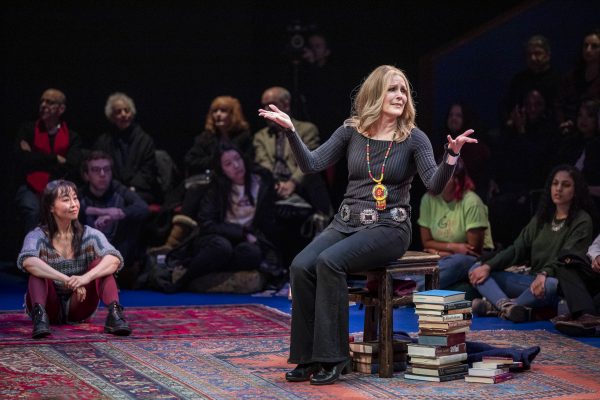Theater Review – “Gloria” Squanders an Iconic Life
By Christopher Caggiano
Seminal events in American feminist history receive a pedestrian dramatization at the A.R.T.
Gloria: A Life by Emily Mann. Directed by Diane Paulus. Staged by the American Repertory Theater (In association with the McCarter Theatre Center and by special arrangement with Daryl Roth) at the Loeb Drama Center, Cambridge, MA, through March 1.

Eunice Wong and Patricia Kalember in Gloria: A Life. Photo: ©APrioriPhotography.com
The same day I saw Gloria: A Life at the American Repertory Theater the U.S. Senate voted not to allow witnesses to testify in the impeachment trial of Donald Trump. It seemed ironic yet fitting to see a play about Gloria Steinem, a progressive women’s activist, on a day when America seemed to be excusing the bad behavior of a serial adulterer and misogynist.
It was impossible to watch Gloria: A Life, Emily Mann’s new drama, and not compare the ferocious backlash against the women’s and civil rights movements in the ’60s, ’70s, and ’80s to the current efforts of Trump and his reactionary minions to roll back all of that social and political progress. As Steinem reminds us in Gloria, progressive forces have made tremendous strides forward in the past 60 years, and so far Trumpism hasn’t succeeded in erasing all of it. At least not yet.
So Steinem’s story feels very much of the moment. Unfortunately, the script itself is a fairly pedestrian and preachy effort, despite the well-known feminist’s connection with a number of momentous events. It’s a worthy tale, flatly told. Gloria: A Life turns out to be yet another offering from the A.R.T. that prioritizes message over craft.
As a theater artist, Mann has made many contributions to the art form, including her 30-year tenure as the artistic director of the McCarter Theatre Center in Princeton, NJ, and her previous plays Execution of Justice (1985) and Having our Say (1995). Gloria: A Life is unlikely to rank among her greatest achievements.
The main problem with Gloria is its expository storytelling. Events are mostly announced and described rather than recreated. This is a shame because Steinem’s experiences are highly compelling, from her journalism career and her infamous Playboy Club exposé to her founding of Ms. magazine to her transformative relationships with civil rights lawyer Florynce Kennedy and Cherokee activist Wilma Mankiller.
What Mann gives us is a sort of Whitman’s Sampler of feminist landmarks, replete with sleights and injustices that are meant to resonate and appall. The problem is that none of these momentous happenings are developed sufficiently to allow the audience to feel their weight. Steinem’s consequential life is reduced to a series of wan vignettes. For instance, her love life is minimized to a five-minute interlude in which she meets, marries, and loses animal activist Dale Bale to lymphoma.
Because of this acceleration, the need to pack a lot in, the drama in Gloria often feels manufactured. It’s clear that we’re supposed to care because of the obvious emotional nature of what is happening, but the play doesn’t earn the pathos. Mann comes closest to generating an emotional connection in her depiction of Steinem’s relationship with her mother, played by an indelible Joanna Glushak.

The cast of Gloria: A Life. Photo: APrioriPhotography.com
We discover, along with Steinem, that her mother began as a journalist herself, before she was sidetracked by her husband’s foundering career, motherhood, and ultimately mental illness. One of the main themes of the play is how women have continually been held back from developing themselves and their skills because of traditional expectations of women’s role in society. Steinem came on board right when this perception was starting to change, and she has the battle scars to prove it.
Director Diane Paulus’s production concept has the audience surrounding a circular playing area in the center of the Loeb Drama Center. The arrangement is meant to evoke a classic “encounter group.” After the production has ended, audience members are invited to stay for “Act II,” which is essentially a 20-minute talkback in which they share their responses to the play.
During the talkback, women in the audience stood and related personal stories about their own remembrances of the women’s and civil rights movements, their own back-alley abortions, coming out to their parents, and other powerful experiences. The honest emotions set the artificiality of the play itself into rather stark relief. When I attended Gloria: A Life, “Act II” wound up being the most moving part of the evening. But, of course, your results may vary.
Christopher Caggiano is a writer and teacher based in Boston. He serves as Associate Professor of Theater at the Boston Conservatory at Berklee. His writing has appeared in American Theatre and Dramatics magazines, and on TheaterMania.com and ZEALnyc.com.
Tagged: American Repertory Theater, Christopher Caggiano, Diane Paulus
